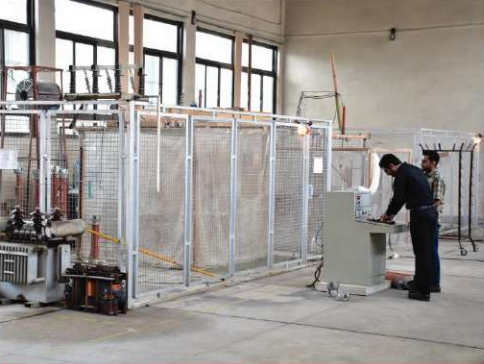Introduction
|
Faculty of Electrical and Computer Engineering |
|

|
|||
|
Introduction |
|||||
|
Electrical and Computer Engineering concerns a variety of issues, such as computers, robots, cell phones, radars, navigation systems, power electronics, power systems and other kinds of electrical systems. The Electrical and Computer Engineering Faculty provides the best to prepare and educate each student to be leader and problem-solver for industry, academia, or the general public.
|
|||||
|
Number of Faculty Members |
Website: https://ece.nit.ac.ir Email: cee@nit.ac.ir Telephone number: +98 (11) 32339214 Fax number: +98 (11) 32310977 Address: Electrical and Computer Engineering Faculty, Babol Noshirvani University of Technology, Shariati Avenue, Babol, Iran. P.O Box: 47148-71167 |
||||
|
Professors |
Associate Professors |
Assistant Professors |
Lecturers |
||
|
4 |
18 |
27 |
1 |
||
|
|
|||||
|
Students (as of Autumn 2020) |
|||||
|
Undergraduate |
Master’s |
Ph.D. |
|||
|
916 |
484 |
125 |
|||
|
Undergraduate Program |
|
Graduate Program |
|
The Electrical and Computer Engineering Faculty offers a comprehensive program for graduate degrees (B.Sc.) in Electrical and Computer Engineering. All B.Sc. students must complete 144 units, which include a final research project equivalent to 3 units. This degree is for students who seek a broad education in the application of Electrical and Computer Engineering Faculty to variety of specific areas, including electronics, control, power, bioelectronics and computer. |
|
The Electrical and Computer Engineering Faculty offers a comprehensive program for both graduate degrees (i.e., M.Sc. and Ph.D.) in the areas of Electrical and Computer Engineering. All M.Sc. students must complete a minimum of 32 credit hours, which include a research project equivalent to 6 units as their M.Sc. thesis. Ph.D. students are required to complete a minimum of 12 credit hours beyond their M.Sc. degree. Ph.D. candidates must also pass a qualifying exam and submit a comprehensive Ph.D. thesis. |
|
Graduate Research Areas |
|
- Electronic Integrated Circuits - Micro and Nano Electronic Devices - Digital Electronic Systems - Power Electronics and Material Machines - Power Systems - Telecommunication Systems - Electromagnetic Fields and Waves - Control Systems - Bioelectronics - Computer Software Engineering - Computer Systems Architecture Engineering |
xxx
| Career Opportunities for Electrical and Computer Engineering |
|
Special-Focus Research Groups |
| Electrical and Computer Engineering graduates have a wealth of promising jobs opportunities. Graduates can find jobs in most enbgineering industries which include Electonic industry, Marine industry and industry of generation, delivery and utilization of electric energy. With the technologies emerging everyday, Electrical and Computer Engineering is needed more and more in multidisciplinary fields like chemical, Oil and Gas Industries. |
|
- Intelligent Systems and Nano Devices Research Group - High Voltage Substation Research Group |
| Research Labs |
|
- Dependable Computing Systems Research Lab. |
xxx
Faculty of Electrical and Computer Engineering
 |
|
Website: https://ece.nit.ac.ir Email: cee@nit.ac.ir Telephone number: +98 (11) 32339214 Fax number: +98 (11) 32310977 Address: Electrical and Computer Engineering Faculty, Babol Noshirvani University of Technology, Shariati Avenue, Babol, Iran. |
Introduction
Electrical and Computer Engineering concerns a variety of issues, such as computers, robots, cell phones, radars, navigation systems, power electronics, power systems and other kinds of electrical systems. The Electrical and Computer Engineering Faculty provides the best to prepare and educate each student to be leader and problem-solver for industry, academia, or the general public.
|
Number of Faculty Members |
|||
|
Professors |
Associate Professors |
Assistant Professors |
Lecturers |
|
4 |
18 |
27 |
1 |
|
|
|||
|
Students (as of Autumn 2020) |
|||
|
Undergraduate |
Master’s |
Ph.D. |
|
|
916 |
484 |
125 |
|
xxx
xxx
xxx
|
Undergraduate Program |
|
The Electrical and Computer Engineering Faculty offers a comprehensive program for graduate degrees (B.Sc.) in Electrical and Computer Engineering. All B.Sc. students must complete 144 units, which include a final research project equivalent to 3 units. This degree is for students who seek a broad education in the application of Electrical and Computer Engineering Faculty to variety of specific areas, including electronics, control, power, bioelectronics and computer. |
xxx
|
Graduate Program |
|
The Electrical and Computer Engineering Faculty offers a comprehensive program for both graduate degrees (i.e., M.Sc. and Ph.D.) in the areas of Electrical and Computer Engineering. All M.Sc. students must complete a minimum of 32 credit hours, which include a research project equivalent to 6 units as their M.Sc. thesis. Ph.D. students are required to complete a minimum of 12 credit hours beyond their M.Sc. degree. Ph.D. candidates must also pass a qualifying exam and submit a comprehensive Ph.D. thesis. |
xxx
|
Graduate Research Areas |
|
- Electronic Integrated Circuits - Micro and Nano Electronic Devices - Digital Electronic Systems - Power Electronics and Material Machines - Power Systems - Telecommunication Systems - Electromagnetic Fields and Waves - Control Systems - Bioelectronics - Computer Software Engineering - Computer Systems Architecture Engineering |
xxx
| Career Opportunities for Electrical and Computer Engineering |
| Electrical and Computer Engineering graduates have a wealth of promising jobs opportunities. Graduates can find jobs in most enbgineering industries which include Electonic industry, Marine industry and industry of generation, delivery and utilization of electric energy. With the technologies emerging everyday, Electrical and Computer Engineering is needed more and more in multidisciplinary fields like chemical, Oil and Gas Industries. |
xxx
| Special-Focus Research Groups |
| - Intelligent Systems and Nano Devices Research Group - High Voltage Substation Research Group |
xxx
| Research Labs |
|
- Dependable Computing Systems Research Lab. |
xxx